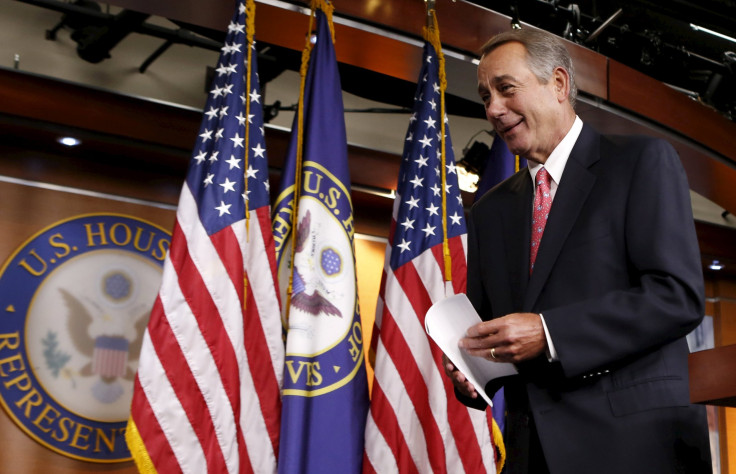House GOP Pass Budget: Small Victory For Boehner After Dramatic Prelude For Republicans

WASHINGTON -- Nothing is proving to be easy for House Republicans. Passing a budget through the chamber is designed -- by law -- to be one of the easiest tasks Congress undertakes. And yet House Republicans have managed to find a way to make the process dramatic.
The House budget passed Wednesday evening on a partisan 228 to 199 vote, with Republicans losing some of their most conservative members. That vote came only after a series of amendments that aimed to get both defense hawks and fiscal conservatives on board with the proposal, which cuts $5.5 trillion. It was a nail-biter at times, with a needed compromise amendment barely obtaining enough votes. And it doesn't mean the fight over Pentagon funding is over, since both the House and the Senate must now pass appropriation bills that President Barack Obama will have to sign.
Call it a victory for House Speaker John Boehner, albeit one with a low bar. But he’s a leader in need of a victory, after multiple efforts this year to bring uncontroversial bills to the House floor have ended in embarrassing disaster. Republican leadership yanked an abortion bill, a border security bill and an education bill after their own members defected. And an attempt to fund the Department of Homeland Security for three weeks went down in flames on the floor last month.
Boehner has been grappling with feuding factions in his own caucus. Conservatives -- who at one point were rumbling about attempting the impossible feat of ousting Boehner -- continue to make for problems in getting legislation off the floor. And in recent months more moderate members have begun to complain about the pull to the right. It’s made for some bad weeks for the speaker.
Budgets shouldn’t be hard. The congressional budget process is designed to allow the ruling party to have all the control. Budgets are often written to be wish lists, never actually rooted in reality, about what a party would get if they could have everything they wanted. Laws passed in 1974 set up a straightforward process that only requires a simple majority in both chambers. It also allows for a process called reconciliation, where the Senate can circumvent the Senate filibuster and send bills to the president with simple majorities.
This year, Republicans in both chambers are using the process of reconciliation to pass a bill to repeal the Affordable Care Act. It’s the only way they can force Obama to veto a repeal, making it mostly a symbolic process to appease conservatives who have argued that leadership wasn’t doing enough to pressure the president.
But while sending a repeal bill to Obama would appear to be enough to appease House Republicans -- who have voted more than 50 times to undo the law or parts of it -- it still caused a week’s worth of headaches for Boehner and the rest of the GOP leadership.
It is generally assumed the most conservative members of the party weren’t going to be happy with the budget. In their ideal proposal -- which only 132 Republicans supported -- deeper cuts would have resulted in getting the budget to balance in six years, but also would deeply affect entitlement programs.
But the real problem this time around turned out to be more moderate Republicans who are focused on Pentagon funding. The budget didn’t raise defense spending enough for many, and it took some last-minute maneuvering to get them on board to avoid the risk of watching the Republican budget fail on the floor.
In the end, Republican leadership set up an unusual approach to passing a budget known as “queen of the hill.” The original budget, which was drafted by Budget Committee Chairman Tom Price, was given a vote and defeated 105 to 319 with all of the Democrats and most of the Republicans voting against it. But an alternate version, which boosted defense spending dramatically, also was given a vote and passed along partisan lines 219-208 -- two votes more than were needed after several conservatives voted against it. The version with the increased defense spending got the most votes, making it the winner.
© Copyright IBTimes 2024. All rights reserved.





















